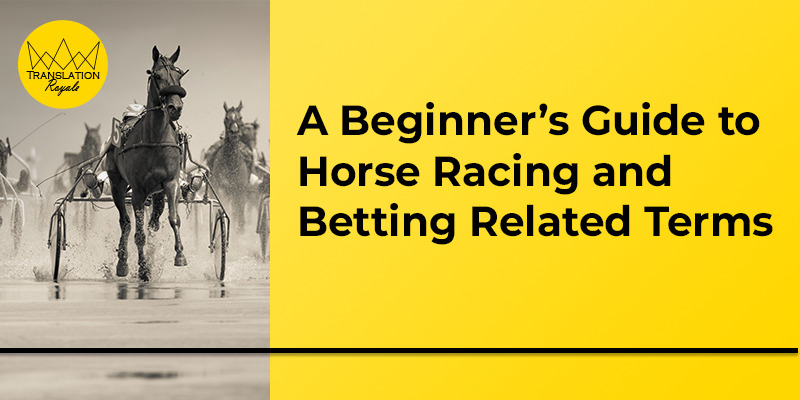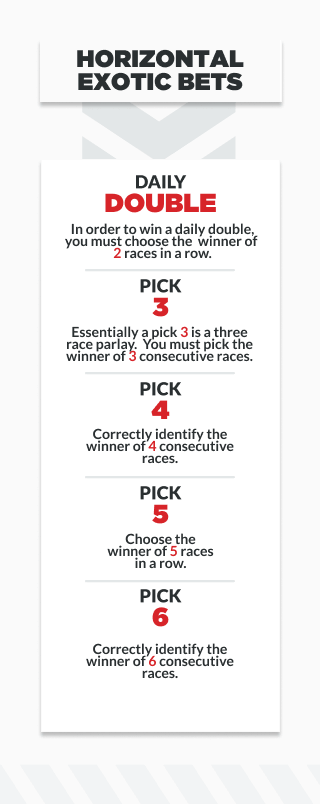Horse race wagering terms

A bet where the 2 horses wagered must finish either 1st or 2nd in the same race. Exotic Bet. A wager on a race that is something other than win, place or show. Minus (Negative) Pool - When enough money is bet on one horse that the pool is insufficient, after the track takeout, to pay the holders of the winning ticket. INTER-STATE (Wagering)- Wagering on a simulcast of a race from another state. INTER-TRACK (Wagering)- Wagering on a simulcast of a race from another track. action: 1) A horse's manner of moving. 2) A term meaning wagering, for example, "The horse took a lot of action," meaning that horse race wagering terms people bet on the horse.
Glossary of Racing Terms
What does dividend mean in horse racing? What's a dividend? This is amount a horse is paying to win or get a place (1st, 2nd and 3rd). Dividends are displayed on TV screens all around the racecourse. The first amount you see is what the horse is paying for a win and the second is its price should it place.
What are the rules for dividend payout? You must buy shares before the ex-date to receive the declared dividend. The record date is the day on which you must be on the company's books as a shareholder to receive the declared dividend. The payment date is the day the company pays the declared dividend to shareholders who own the stock before the ex-date.
What is the 90 day rule for dividends? Preferred stocks have a different holding period than common stocks and investors must hold preferred stocks for more than 90 days during a 181-day period that starts 90 days before the ex-dividend date. 2The holding period requirements are somewhat different for mutual funds.
What is a two horse bet called? Exacta — Pick two horses in one race. If they finish 1st and 2nd, in exact order, you win. Quinella — Pick two horses. If they finish 1st or 2nd, in either order, you win.
What is the best wager in horse racing? Superfecta. This wager is like the exacta and trifecta, but the bettor is picking the exact order of finish for the top four runners in a particular race. Although not as popular as exactas or trifectas, some punters enjoy the high-reward nature of superfecta bets.
What are the 4 dividend policies? First is a regular dividend policy, the second is an irregular dividend policy, the third is a stable dividend policy, and lastly no dividend policy. The stable dividend policy is further divided into per share constant dividend, pay-out ratio constant, stable dividend plus extra dividend.
How do horse racing payouts work? The numbers displayed as 4-7 or 2-5 tell you what you pay and how much you get back if the horse you bet on wins. The first number tells you how much you could win, the second number is the amount you bet. So, if the odds are listed as 2-1, you'll get $2 for every $1 you bet.
What is the rule for dividend? Dividend should be declared only out of profits earned by the company. However, profits out of capital transactions, if not realised in cash, shall be excluded for this purpose. Certain profits do not arise in the normal course of business as they are earned out of capital transactions.
Glossary of betting terms
A comprehensive account from which past performances are compiled, showing the race position of each horse at various stages of the race. The light reddish — brown colour of a horse. Mane and tail are usually the same colour as the body. A race in which all horses entered are subject to being purchased for a specific price, prior to the race. All horses in the race are for sale.
In Standardbred racing the colours represent the driver. Standardbred drivers register their colours and wear them every time they race. An intact male horse under the age of a five thoroughbred or under four years of age Standardbred and Quarter horses. A race with conditions that limits the class of a horse that can enter. Eligibility is based on sex, money earned or number of races won.
The claim is made by a race participant immediately after the completion of the race. A betting establishment that is away from the track that the horse races are taking place at. Also refers to a wet race surface. Also known as Race Under Saddle — is a hybrid of harness and thoroughbred racing that has gained popularity in Europe.
Race Fans Member Information. Glossary of betting terms. A horse that is four years old or older also called senior. A race other than claiming for which the racing secretary drafts certain conditions to determine weights — for higher caliber horses. Horse race wagering terms A horse that is officially entered into a race, but not permitted to race unless the number of race participants is reduced by a horse or horses being scratched.
A jockey who receives a weight allowance until they have won a certain number of races. A pound weight allowance is usually allowed until the apprentice jockey wins five races, after which many are allowed a 5-pound weight allowance for a period of one calendar year. B Baby Race. The straightaway on the far side of the race track.
Also refers to the stable area. A person who puts shoes on horses. Blacksmith is another word for farrier. Owner of the dam mother horse at the time foal is born. The colour of a horse that has a brown body and nose, the tail and mane are black. The colour of a horse that has a dark yellow or gold body and a black mane and tail. D Daily Double.  A type of wager that the winners of two consecutive races usually the first two races are bet.
A type of wager that the winners of two consecutive races usually the first two races are bet.
Two or more horses finish the race at the exact same time. Change of order of finish by officials for an infraction of the rules. When a horse finishes a race more than 35 lengths behind the winner. The person holding a licence or permit to drive harness horses. There are different types of licences, which correspond to differing levels of experience.
E Early and Late Closing Events. A race requiring a series of payments made by the trainer or owner starting closer to the race date. Early and late refers to the time period involved. Harness, blinkers, whip etc. A bet where the 2 horses wagered must finish 1st and 2nd in exact order in the same race. A bet where the 2 horses wagered must finish either 1st or 2nd in the same race.
A wager on a race that is something other than win, place or show. F Farrier. A person who puts shoes on a horse. Also called a blacksmith. The horse with the largest amount of total money bet. A female horse 4 years of age or younger Thoroughbred and 3 years or younger Standardbred or Quarter horse. The first horse to attempt to pass on the outside of the leading horse in a race Standardbred.
A Standardbred pacer who races without hopples leg straps. G Gait. The way a horse's legs move when it races — trot, gallop, pace, run etc. The starting equipment that Thoroughbred and Quarter horses break out of at the beginning of a race. Standardbreds line up behind a gate attached to a vehicle that is moving to start a race. A track that is not the very best condition but is better than slow or sloppy.
A licensed person responsible for the daily care of a race horse. H Hand. Across the board — A bet on a horse to win, place and show. If the horse wins, the player collects three ways; if second, two ways; and if third, one way, losing the win and place bets.
Box — A betting term denoting a combination bet whereby all possible numeric combinations are covered for certain horses. Bridge jumper — A person who wagers large amounts of money, usually on short- priced horses to show, hoping to realize a small but almost certain profit. The term comes from the structure those bettors may seek if they lose the bet.
Daily Double or Double — Type of bet calling for the selection of winners of two consecutive races. Exacta — A wager in which the first two finishers in a race, in exact order of finish, must be picked. Ats basketball meaning Exacta box — A wager in which all possible combinations using a given number of horses are selected.
Exotic bet — Any bet other than win, place, or show that requires multiple combinations. Examples of exotic wagers are trifecta, Pick 6, and Pick 4. Handle — Amount of money wagered in the pari-mutuel system on a race, full day of races, or entire racing season at a track. Pari-mutuel — System of wagering where all the money is returned to the bettors after deduction of track and state percentages.
Parlay — A multi-race bet in which all winnings are subsequently wagered on a succeeding race. Part wheel — Using a key horse or horses in different, but not all possible, exotic wagering combinations. Pick 6 or other number — A type of multi-race bet in which the winners of all the included races must be selected. Trifecta box — A trifecta wager in which all possible combinations using a given number of horses are bet upon.
Wheel — Betting all possible combinations in an exotic wager using at least one horse as the key. Most non-sweaters are athletic, but the condition appears frequently in pastured horses, who aren't ridden. Anhydrosis usually occurs when both the temperature and humidity are high. Horses raised in temperate regions and shipped to hot climates are most prone to develop the condition, but acclimated horses can be at risk, as well.
Clinical signs include inability to sweat; increased respiratory rate; elevated body temperature and decreased exercise tolerance. The condition is easily reversed by moving the horse to a more temperate climate. Usually 10 pounds until the fifth winner, seven pounds until the 35th winner and five pounds for one calendar year from the 35th winner.
This rule varies from state to state.